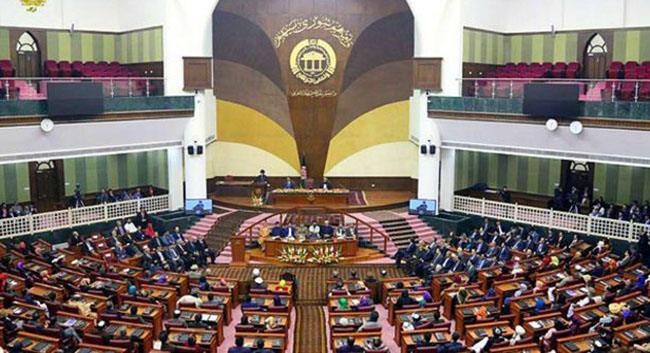Parliament is considered the beating heart of democracy and established to protect the rights and dignity of a nation and decentralize the power of state. Members of Parliament (MPs), who represent the nation, will have to approve laws based on society’s religious tenets, moral norms and social values. Legal defects and lack of respect to citizens’ rights and liberty will result in political and social challenges in a community.
The authority of people’s representatives does not necessarily belong to legislation but also monitoring the government. The Constitution of Afghanistan states in article 89, “The House of People shall have the authority to establish a special commission, on the proposal of one third of its members, to review as well as investigate the actions of the Government.” Moreover, MPs are able to decide about the elucidation session of ministers and even the president is “responsible to the nation as well as the House of People”.
The theory of “segregation of powers” suggests that centralization of power will lead to corruption and absolute monarchy. When all power is in the realm of a single entity in a government, corruption and dictatorship will emerge. Based on this theory, it was the unlimited and absolute power of the kings, in the past, that conduced to violence and bloodshed and the rights and liberty of the people were violated on a large scale. With the centralized power, the legislative, executive and judiciary powers are in the hands of a single entity and the ruler will not deem himself/herself responsible to the nation. Since the violent practices of kings and rulers outraged human conscience, the theory of segregation of powers was introduced to tackle the issue.
In democratic system, the segregation of powers is a key element and parliament, which reflects the national will, is the heart of democracy. The legislative, executive and judiciary powers, which form a government, will have to move parallel to one another and share an organic relation so as to ensure peace and stability and protect the fundamental rights of citizens. In other words, since these three powers pursue the same objectives, they should not move to different directions.
The legislative power will supervise the activities of ministers (legislative power) so as to make sure that the government fulfills its commitments. Although the segregation of powers prevents from the centralization of power, it does not necessarily mean that the state will not show inclination to corruption or injustice. After the downfall of the Taliban’s regime, Afghanistan moved towards democratization and the first round of parliament was inaugurated in the solar year of 1384 after an election, in which a large number of men and women participated. Moreover, the second round was also inaugurated by former President Hamid Karzai in 1389. Despite the third round of presidential election, however, the third parliamentary election is yet to be held. The Constitution states in article 83, “The work period of the House of People shall terminate, after the disclosure of the results of the elections, on the 1st of Saratan of the 5th year and the new Parliament shall commence work. The elections for members of the House of People shall be held 30 to 60 days prior to the expiration of the term of the House of People.” Hence, the second round of parliament was terminated more than a year ago and currently it has no legal basis to continue. After all, one of the President’s duties mentioned in article 64 is supervising the implementation of the Constitution.
In spite of the establishment of democratic administration, undemocratic practices and lack of law enforcement prevail in the country. To one’s unmitigated chagrin, the government, which is supposed to supervise the law, violates the Constitution – this is a slap in the face of democracy. In addition, the National House, where nation’s representatives are to raise their voice against injustice and ensure law enforcement, has no legal basis. Is parliament really the “beating heart of democracy”?
If it is so, democracy – in Afghanistan – needs heart surgery. In such a case, it is no surprise to see Afghanistan on the list of world’s most corrupt countries. When law is not implemented by executive power and government machinery suffers from political syndrome, democracy is deemed moribund. It is believed that lack of law enforcement is one of the highly serious issues in the country which hampers the process of democratization and leads to greater challenges.
Since the National House lacks legal basis, there remain civil society and media to monitor the government and put pressure on it so as to act upon law. In case of violating law by authorities, the civil society is to organize peaceful demonstrations and media should reflect the voice of people.
To strengthen the nascent democracy and protect the rights and freedoms of the nation, the state will have to not only implement the law but also abide by law. In short, the bulk of the challenges lie in the machinery of government. All the three aforementioned powers have the responsibility of establishing suitable law, putting it to force and prosecuting the violators to form a democratic society void of violence and bloodshed. Since law is the backbone of a society, lack of respect to it will pave the way for political, social and economic challenges – as Afghanistan is wrestling with them.
Home » Opinion » When Law is not Respected
When Law is not Respected
| Hujjatullah Zia

